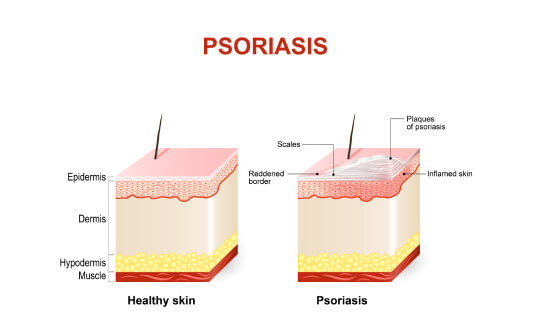Psoriasis is a widespread skin disease. Sometimes it has a rather severe clinical course. In addition to cosmetic defects on the skin, psoriasis causes lesions of the joints and internal organs. The traditional treatment is not always effective. However, new methods of therapy are constantly being developed. Some of them have already managed to prove their effectiveness and are successfully applied in the world's best hospitals.
Content
- Local treatment
- Phototherapy
- Systemic treatment
- Biological treatment
- Thermal springs and hydrotherapy
- Psychotropic treatment
- Leading hospitals and cost of treatment
- Treatment abroad with Booking Health
Local treatment
In most people, psoriasis is mild. It affects no more than 5% of the body surface. In such cases, it is sufficient to carry out local treatment; systemic therapy is not required. This is a more favorable clinical situation because drugs used for systemic therapy are mostly toxic; they negatively affect the immune system and function of internal organs.
While undergoing therapy in German hospitals, an individualized treatment program for the disease is selected. There are many types of psoriasis. They differ in the localization, number, shape, and type of morphological elements which appear on the skin. Depending on the severity, localization, and duration of the process, treatment may involve the administration of the following medicines:
- Salicylic acid
- Naphthalan
- Ichthyol
- Tar
- Corticosteroids
- Vitamin D analogs
- Calcineurin inhibitors
- Emollients
Corticosteroid drugs are not intended for long-term use, as they can cause skin atrophy. There is a large number of drugs with different strengths in this group. The doctor individually selects the treatment regimen in each case. At the same time, he tries to prescribe treatment that will guarantee maximum results with minimal negative influence on the patient's skin.
Synthetic analogs of vitamin D are used in the treatment of psoriatic skin lesions more and more often. They inhibit proliferative processes in keratinocytes (skin cells that intensively divide in psoriasis and form characteristic plaques). Drugs from this group normalize the state of the immune system. They suppress the expression of TNF-alpha and interleukin-2 inhibitors. Vitamin D analogs are more effective with each subsequent use. Significant results can be achieved with their help within a few days after the beginning of therapy.
Calcineurin inhibitors are drugs that block T-lymphocyte signal transduction. Their effect is approximately the same as the effect of glucocorticoids. However, they have a better safety profile. Experienced doctors in European hospitals often prescribe them to patients with a rash on their faces. Calcineurin inhibitors are preferable to glucocorticoids since they do not have side effects typical for this group of drugs.
Emollients are used to soften skin. Thanks to these remedies, skin is less dry, and its peeling is eliminated. The moisture of the skin increases. This is especially important in expressed clinical manifestations of psoriasis and while using ultraviolet radiation for the treatment. Emollients are applied to the wet skin immediately after a shower. It is confirmed that this group of drugs reduces the overall duration and costs of the treatment, as well as the time of a hospital stay.
Phototherapy
There are several types of phototherapy. This is a type of local therapy with ultraviolet rays. Historically, photochemotherapy was the first treatment method. Before the procedure, a photosensitizer (8-methoxypsoralen and others) is injected into the human body. It increases the susceptibility affected by psoriasis tissues to ultraviolet radiation. Then irradiation with a long-wave spectrum of ultraviolet rays is carried out. This procedure inhibits cell proliferation slowing the formation of psoriatic plaques.
Sometimes photosensitizers are not injected but used as a bath. After applying the substance to the skin, a person is moved to an ultraviolet cabin, where he undergoes an irradiation session. This method is effective and safe since there is no systemic influence of a photosensitizer on the human body.
Selective phototherapy is another method in which long wave and medium wave radiation are combined. It is mainly used in vulgar or exudative psoriasis. The technique can be applied at the progressive stage of the disease. Its main advantage is safety. There is no need to take a photosensitizer, which sometimes causes side effects.
Phototherapy with narrow spectrum beams is mainly used in developed countries. Clinical trials show that it leads to faster remission of psoriasis compared with other methods of irradiation. Moreover, it is safer than photochemotherapy.
Phototherapy with an excimer laser is an even more effective and safe treatment method. The total dose of irradiation that is required for the removal of psoriatic plaques is six times lower. Therefore, the risk of side effects is reduced.
Systemic treatment
Systemic therapy is used only in urgent cases because all antipsoriatic drugs for oral intake have a toxic effect. These medications are poorly tolerated by patients, as they often cause side effects.
The following drugs are used:
- Glucocorticoids for oral intake
- Methotrexate (prescribed with folic acid in order to prevent anemia)
- Cyclosporin A (inhibits the activity of T-lymphocytes and reduces their antigenic sensitivity, therefore preventing psoriasis progression)
- Acitretin (normalizes proliferation and keratinization of epidermal cells)
Biological treatment
Biological therapy is a relatively new trend in the treatment of psoriasis. Monoclonal antibody drugs are used. This method is more prevalent in western medicine; in hospitals in developing countries, it is still used rarely.
This therapy is highly effective. It is most often prescribed in the following cases:
- Lesion of more than 10% of body surface
- Resistance to other methods (local treatment, phototherapy)
- Contraindications to the systemic therapy (biological therapy is more expensive, but it is safer for a patient)
The use of monoclonal antibodies allows for achieving significant regression of psoriasis within 2-3 months, at least in 80% of patients. During this period, complete remission of the disease occurs in 25-30% of patients.
Thermal springs and hydrotherapy
Climatotherapy is widely used in the treatment of psoriasis. Patients often receive treatment at the Dead Sea. Special climatic conditions are present here, such as:
- The highest atmospheric pressure on the Earth
- High temperature
- Low humidity
- Optimal ratio of long and medium wave rays (due to the evaporation which filters sunlight rays)
- High salt concentration in the water (nearly ten times higher than in the Mediterranean)
The effectiveness of the treatment of psoriasis by climatic conditions is confirmed by clinical trials. After staying at the resorts of the Dead Sea for four weeks, 60-70% of patients experience remission, and another 20% have a significant improvement. A slight decrease in symptoms is observed in 10% of people.
Psychotropic treatment
Cognitive-behavioral therapy is carried out in modern hospitals. It does not reduce the number of psoriatic plaques on the skin but changes the patient’s attitude to his illness, thereby making his life more comfortable. Cognitive-behavioral therapy, CBT allows a person to get rid of the following problems:
- Social phobia
- Depression
- Stress
- Fear
- Psychological discomfort
If necessary, psychotropic drugs are used. Patients may receive antidepressants, tranquilizers, mood stabilizers, and antipsychotics. Some of these drugs simultaneously have a symptomatic effect – they reduce itching in psoriasis, normalize nighttime sleep, and eliminate pain in joints in psoriatic arthritis.
Only experienced specialists should prescribe psychotropic treatment, as many drugs can cause exacerbation of psoriasis. These are the majority of serotonergic antidepressants (including Fluoxetine), lithium medications, carbamazepine, valproates, and some other drugs.
Leading hospitals and cost of treatment
Patients with psoriasis can undergo examination and treatment in the Dermatology Departments of University hospitals. This allows doctors to use all the diagnostic capabilities and, if necessary, involve specialists from different medical fields in the therapeutic process.
The following hospitals are leading in the treatment of psoriasis:
- University Hospital of Ludwig-Maximilian University of Munich, Department of Adult and Pediatric Dermatology, Allergology
- University Hospital Frankfurt-am-Main, Department of Dermatology, Venereology and Allergology
- University Hospital Erlangen, Department of Dermatology
- University Hospital Hamburg-Eppendorf, Department of Dermatology and Venereology
- University Hospital Ulm, Department of Dermatology and Allergology
The cost of diagnostics and conservative treatment of psoriasis starts from 1,397 euros. The medical program includes examinations, consultations with the necessary specialists, and elaboration of the optimal treatment regimen.
Treatment abroad with Booking Health
In Germany, there are many good specialized hospitals where patients go in order to receive treatment for psoriasis. A comprehensive approach is applied there. Dugs, phototherapy, and various types of climatic influence are used in the country. There are thermal springs in Germany.
The method of eliminating psoriatic plaques with the help of fish is widely used. A person is placed in a thermal spring with a whirlpool effect. Two types of fish remove damaged skin and stimulate regenerative processes. Mineralization of water, which contains high concentrations of zinc and selenium, contributes to the healing effect.
If you want to undergo treatment in German hospitals, you can use the services of the company Booking Health. We may organize this trip for you. The range of our services includes:
- Choosing the right hospital, taking into account its specialization. Also, statistics on the treatment of certain diseases is considered.
- Communication with your doctor.
- Translation of medical records. All your examinations will be investigated, so you will not have to undergo them again.
- Negotiations with a hospital in order to make costs for the treatment and diagnostics more favorable for you. Thanks to the company Booking Health you will save up to 50% of the price.
- Short waiting period. You will receive medical services exactly when you need them.
- Help in buying and forwarding medicines abroad.
- Thanks to our employees, the psoriasis treatment program will be completely controlled at all stages.
- If necessary, we will arrange additional therapeutic procedures or diagnostic examinations.
- Transfer from the airport to the hospital and back, booking hotels and plane tickets.
- Providing communication with the medical institution after treatment completion.
You can always find out how your funds are spent. All unclaimed funds will be returned to your banking account after the final calculation. We provide 100% transparency of financial aspects.
Choose treatment abroad and you will for sure get the best results!
Authors:
The article was edited by medical experts, board certified doctors Dr. Vadim Zhiliuk, Dr. Sergey Pashchenko. For the treatment of the conditions referred to in the article, you must consult a doctor; the information in the article is not intended for self-medication!
Sources:
Read:
Why Booking Health - questions and answers
How to make right decision when choosing the clinic and specialist
7 reasons to trust to the rating of clinics on the Booking Health portal
Don't know where to start?
Contact Booking Health







